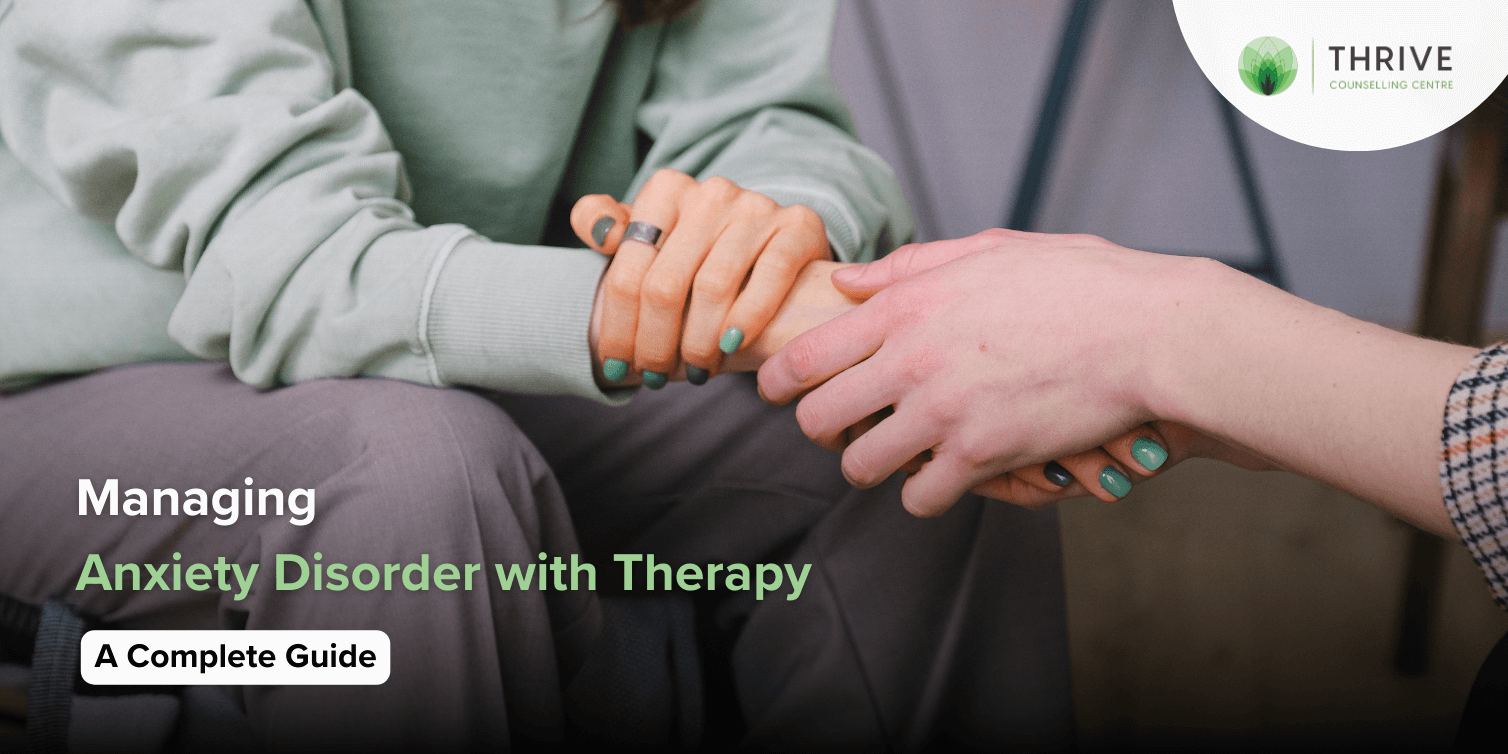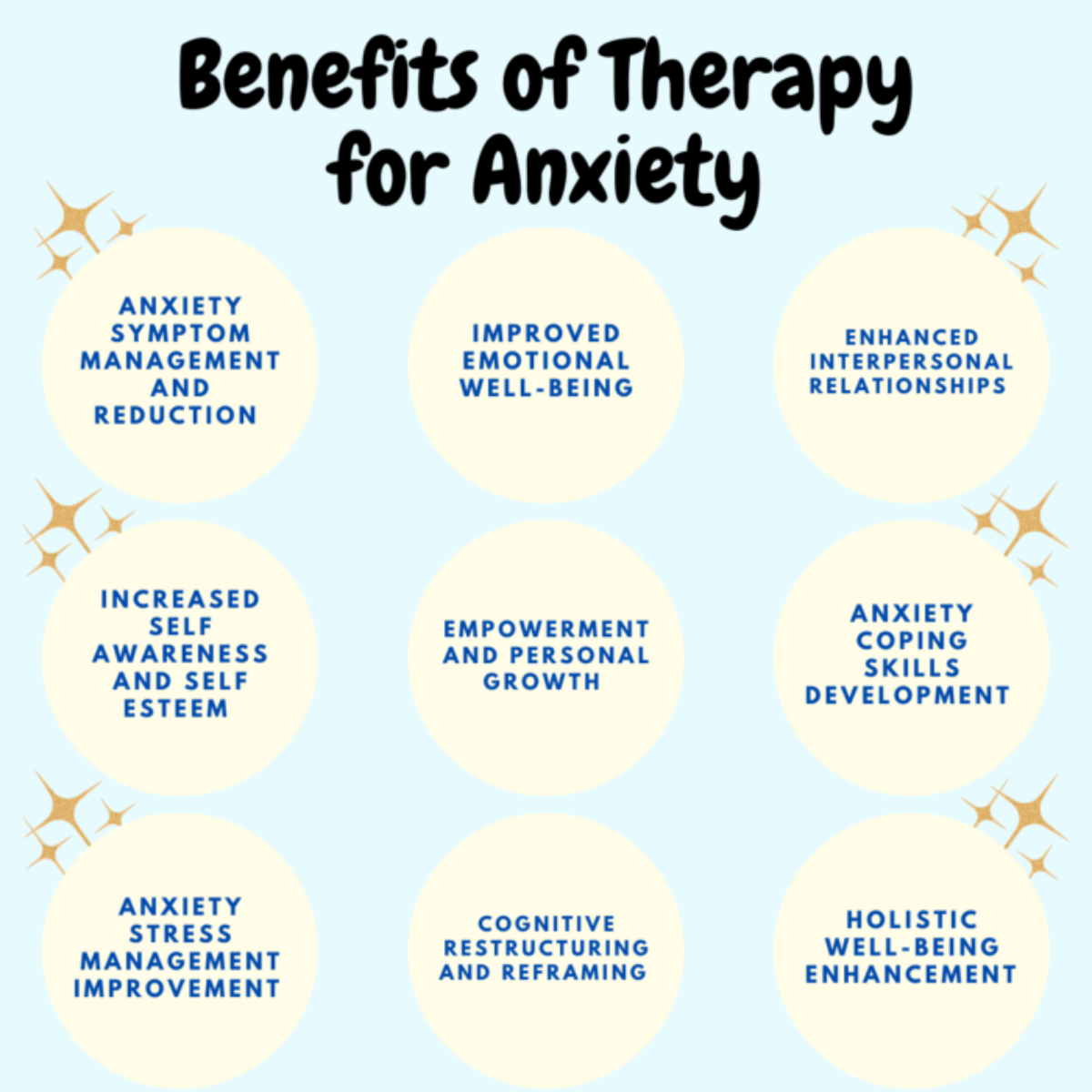Start your journey with counselling for anxiety disorder led by professionals
Discovering Various Approaches in Counselling for Anxiety Problem for Enduring Modification
When taking on stress and anxiety conditions, it's crucial to discover a range of counseling approaches. Each method supplies unique understandings and devices to help you handle your signs effectively. You may locate that combining strategies can generate the best results. Comprehending the subtleties of these methods is key to promoting long lasting modification. What happens if the appropriate combination could release a new degree of psychological health for you?
Understanding Stress And Anxiety Problems: A Brief Review
Stress and anxiety problems, which impact countless people worldwide, can significantly impact life. You could experience frustrating feelings of concern or fret that appear uncontrollable. These sensations can bring about physical signs like a racing heart, sweating, and even lightheadedness. Typical kinds of anxiety conditions consist of generalized stress and anxiety condition, panic attack, and social anxiousness problem. Each has unique indicators, but they all share a tendency to interrupt your regular and relationships.Understanding the origin of your anxiety is essential. It may originate from genetics, brain chemistry, or life experiences. Identifying your triggers can assist you handle your actions better. It is essential to bear in mind that you're not the only one in this battle. Numerous people encounter comparable obstacles, and looking for aid is a solid action towards sensation much better. By learning more about stress and anxiety problems, you're already on the course to understanding and managing your problem better.
Cognitive-Behavioral Therapy: Testing Adverse Thought Patterns
In Cognitive-Behavioral Treatment, you'll start by recognizing the unfavorable thought causes that add to your anxiousness. As soon as you acknowledge these thoughts, you'll deal with replacing them with more positive options. Together, you'll build efficient coping methods to aid handle your anxiousness in everyday situations.
Determining Negative Idea Triggers

Identifying the particular triggers behind your unfavorable ideas can be essential in managing stress and anxiety when you experience moments of distress. Start by taking notice of situations that prompt sensations of concern or concern. Is it a crowded room, a forthcoming target date, or a conversation with particular people? Take down these instances in a journal. This will aid you determine patterns in your reasoning. Notice physical sensations that accompany your negative thoughts, like a racing heart or rigidity in your chest. By identifying these triggers, you obtain understanding right into what's sustaining your anxiousness. Recognizing these connections is the initial step in testing those thoughts and inevitably gaining back control over your psychological feedbacks.
Changing Thoughts With Positives
Testing unfavorable idea patterns is a necessary action in changing your attitude and reducing anxiety. You might usually discover yourself trapped in cycles of insecurity or devastating reasoning. Instead of allowing these thoughts dictate your sensations, method changing them with realistic choices or favorable affirmations. For example, when you assume, "I can not manage this," change it to, "I can handle difficulties one step each time." This basic adjustment can greatly impact your emotion. Regularly identifying and responding to these unfavorable thoughts assists develop a healthier interior discussion. Bear in mind, it takes some time and effort, however constantly practicing this strategy can lead to lasting adjustment, encouraging you to deal with anxiousness with renewed self-confidence and durability.
Structure Coping Techniques With Each Other
Changing adverse ideas is just the beginning of taking care of stress and anxiety effectively. To develop enduring adjustment, you require to develop coping methods that encourage you. Cognitive-Behavioral Therapy (CBT) helps you recognize and challenge those unhelpful idea patterns. Together, you and your therapist can explore how these ideas influence your feelings and behaviors.Start by establishing practical techniques, like journaling or mindfulness workouts, that allow you to confront stress and anxiety head-on. When you encounter your fears slowly, you'll discover to respond in different ways.

Mindfulness and Acceptance-Based Approaches: Cultivating Present-Moment Recognition
As you navigate the intricacies of anxiety, including mindfulness and acceptance-based methods can substantially boost your capacity to cultivate present-moment awareness. By concentrating on the right here and now, you'll find that you can observe your thoughts and feelings without judgment (Counseling services for anxiety). This practice helps you acknowledge your anxiety without feeling bewildered by it.Engaging in mindfulness exercises, such as deep breathing, body scans, or directed meditations, allows you to ground yourself in your current experience. Acceptance-based approaches motivate you to welcome your feelings as opposed to battle versus them. When you approve your sensations, they shed their power over you.Incorporating these methods into your day-to-day routine can transform exactly how you react to stress and anxiety. You'll develop strength and discover to navigate difficult scenarios with higher simplicity. Eventually, growing present-moment awareness lays the structure for long-term change, equipping you to lead a much more fulfilling life
Exposure Therapy: Facing Anxieties Gradually
Direct exposure therapy helps you confront your concerns in a progressive way, making it less overwhelming. You'll find out techniques to deal with anxiety-provoking situations step by step, while also developing coping methods to manage your responses. This method equips you to take control and decrease anxiousness with time.
Gradual Exposure Methods

When dealing with stress and anxiety, slowly facing your fears can be a powerful method to reclaim control. This method, called progressive direct exposure, involves slowly subjecting on your own to the circumstances or things that trigger your stress and anxiety. Beginning with much less daunting circumstances and slowly function your way approximately even more tough ones. If you're worried of public speaking, you could start by speaking in front of a mirror, after that progress to sharing ideas with a buddy, and eventually attend to a little group. Each step assists desensitize you to the fear, developing your confidence gradually. Keep in mind, it's essential to speed yourself and celebrate little triumphes as you move through this process, enhancing your capability to manage anxiety effectively.
Building Coping Approaches
Structure reliable coping techniques is crucial for managing anxiousness, particularly as you confront your worries slowly - Counseling services for anxiety. One powerful technique is direct exposure therapy, where you start by encountering your anxieties in a regulated manner. Begin with less daunting circumstances and slowly function your way approximately even more challenging scenarios. This steady direct exposure assists desensitize you to stress and anxiety sets off, making them much less overwhelming.Incorporate relaxation strategies, such as deep breathing or mindfulness, to soothe your mind during direct exposure. Track your progression, celebrating little success along the means to enhance your confidence. Keep in mind, it's all right to take your time; the objective isn't perfection but consistent enhancement. By constructing these approaches, you'll empower yourself to browse anxiousness and welcome life extra totally
Psychodynamic Treatment: Uncovering Source of Anxiety
Psychodynamic treatment explores the unconscious mind, exposing the source of your anxiety. By examining your ideas, sensations, and previous experiences, this approach assists you reveal underlying conflicts and unsettled problems that might add to your existing anxiousness. You'll deal with a therapist to explore childhood experiences, partnerships, and psychological patterns that form your reactions today.As you get understanding into these deeper layers of your mind, you'll start to recognize exactly how previous occasions affect your existing habits. This understanding can cause catharsis, enabling you to process feelings you might have suppressed.Through the healing connection, you can likewise determine defense systems that might have created with time, providing a more clear course to transform. Eventually, psychodynamic treatment outfits you with the tools to resolve your anxiousness at its core, promoting long-term change in your emotional wellness.
Integrative and Alternative Techniques: Combining Methods for Greater Effectiveness
Integrating numerous healing techniques can boost your journey toward taking care of anxiousness better. By combining elements from cognitive-behavioral therapy, mindfulness techniques, and holistic approaches, you can produce an individualized technique that addresses your unique requirements. You may make use of cognitive-behavioral techniques to challenge unfavorable idea patterns while incorporating mindfulness exercises to ground on your own in the present moment.Additionally, exploring all natural techniques such as yoga exercise or meditation can advertise relaxation and lower stress and anxiety signs. This mix enables you to develop higher self-awareness and resilience.Experimenting with these diverse techniques can assist you uncover what resonates most with you. Keep in mind, it's regarding finding a synergy that functions, rather than staying with a solitary strategy. This integrative strategy not only provides instant relief yet likewise cultivates long-term abilities for taking care of stress and anxiety, equipping you to redeem control over your life.
The Function of Support Solutions: Structure Strength Through Connection
While it might appear that handling anxiety is a solitary trip, having a strong support group can play an essential duty in your durability. Bordering on your own with understanding buddies, household, or assistance groups develops a risk-free space where you can openly share your feelings and experiences. When you get in touch with others, you remind yourself that you're not the only one in this struggle.These relationships use inspiration and can supply sensible coping methods that have actually helped others. It's additionally a chance to obtain perspective; pals can help you see situations differently, lowering sensations of isolation.Moreover, emotional assistance fosters a sense of belonging, which can greatly reduce anxiety signs and symptoms. By leaning on your support system, you can construct strength and deal with difficulties extra efficiently. Remember, connecting for assistance suggests strength, and it can make all the distinction in your journey toward managing anxiousness.
Frequently Asked Inquiries
What Are the Typical Signs of Anxiousness Conditions?
You may experience uneasyness, tiredness, problem concentrating, irritation, muscle tension, and sleep disruptions. Physical symptoms can include rapid heart beat, sweating, and shivering. Recognizing these indicators early can assist you look for suitable assistance and therapy.
For How Long Does Therapy Commonly Last for Anxiety Problems?
Therapy for anxiousness disorders usually lasts anywhere from a few weeks to a number of months. It actually depends on your private needs, development, and the strategies your therapist makes use of to assist you manage your stress and anxiety effectively.
Can Medication Be Used Alongside Therapy for Anxiety?
Yes, medicine can definitely be used along with therapy for anxiety. Incorporating both strategies often improves treatment efficiency, helping you check here manage signs while exploring underlying issues via counseling (Counseling services for anxiety). Constantly consult your medical care company for personalized suggestions
Exist Self-Help Methods for Taking Care Of Anxiousness?
Yes, there are several self-help techniques for managing stress and anxiety. You can exercise mindfulness, engage in regular workout, keep a well balanced diet plan, develop a regular, and make use of deep breathing strategies to help in reducing anxiousness signs and symptoms properly.
Just how Do I Know if I Required Expert Assistance for Stress And Anxiety?
